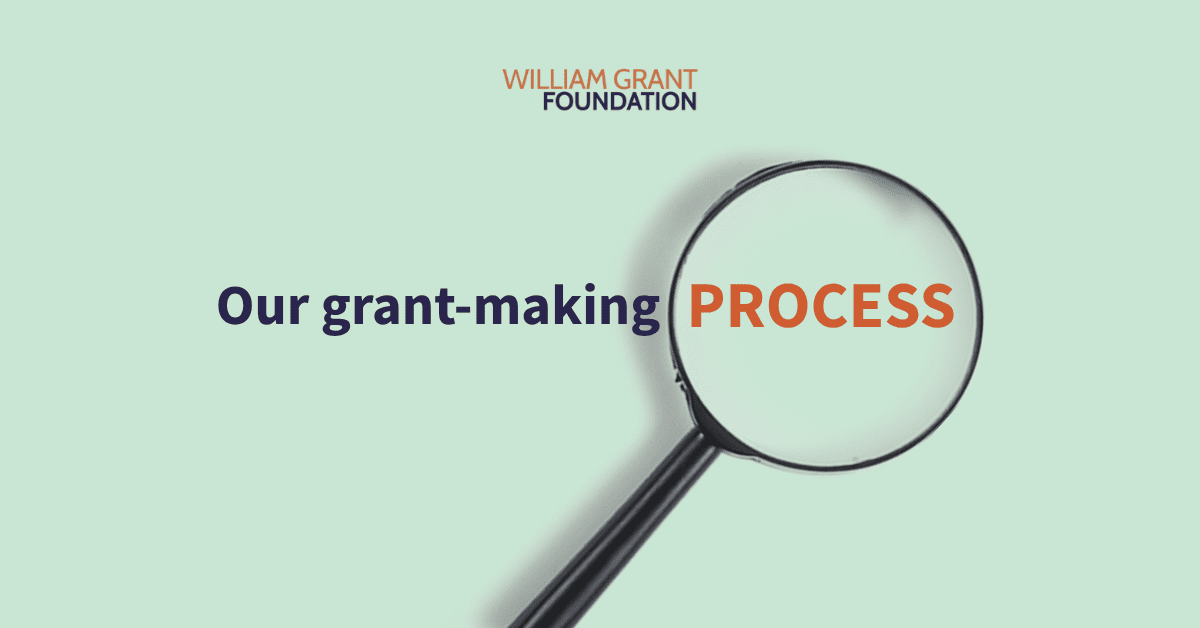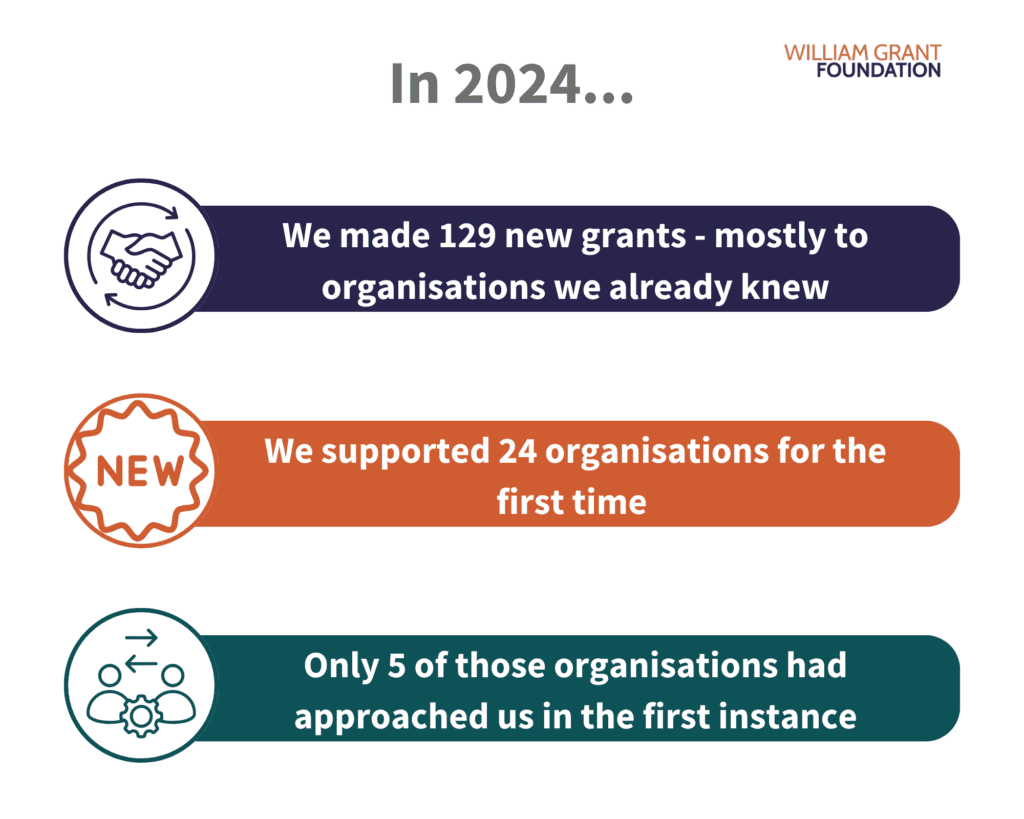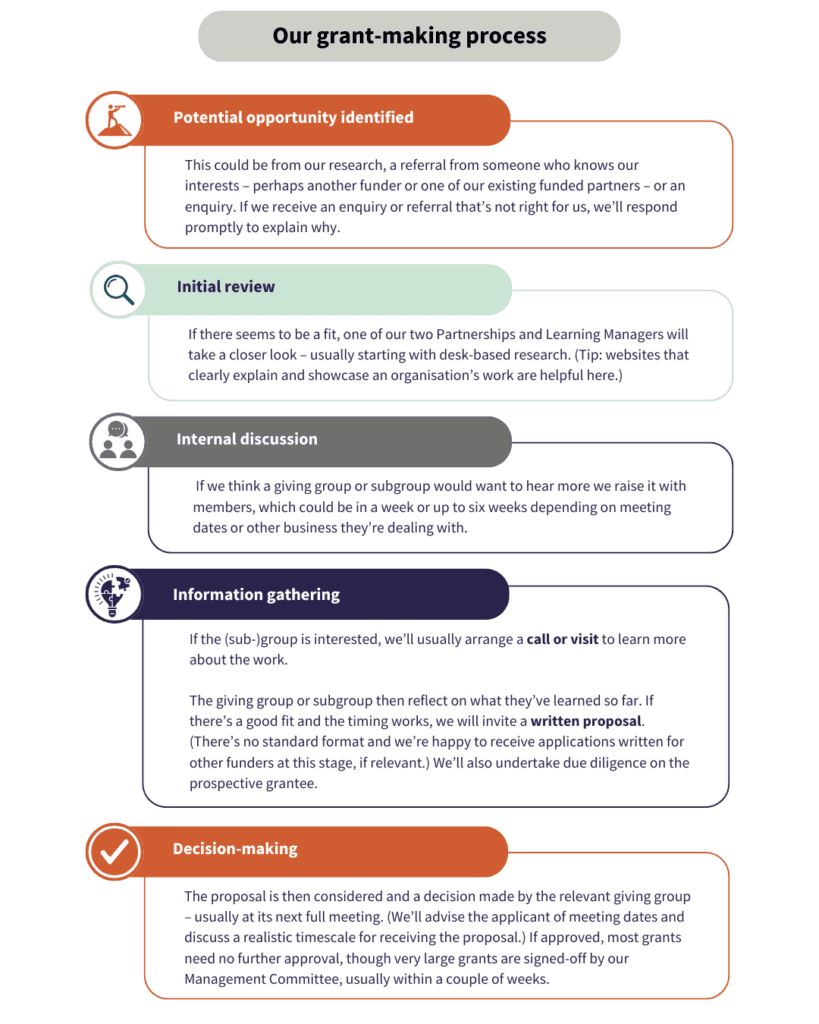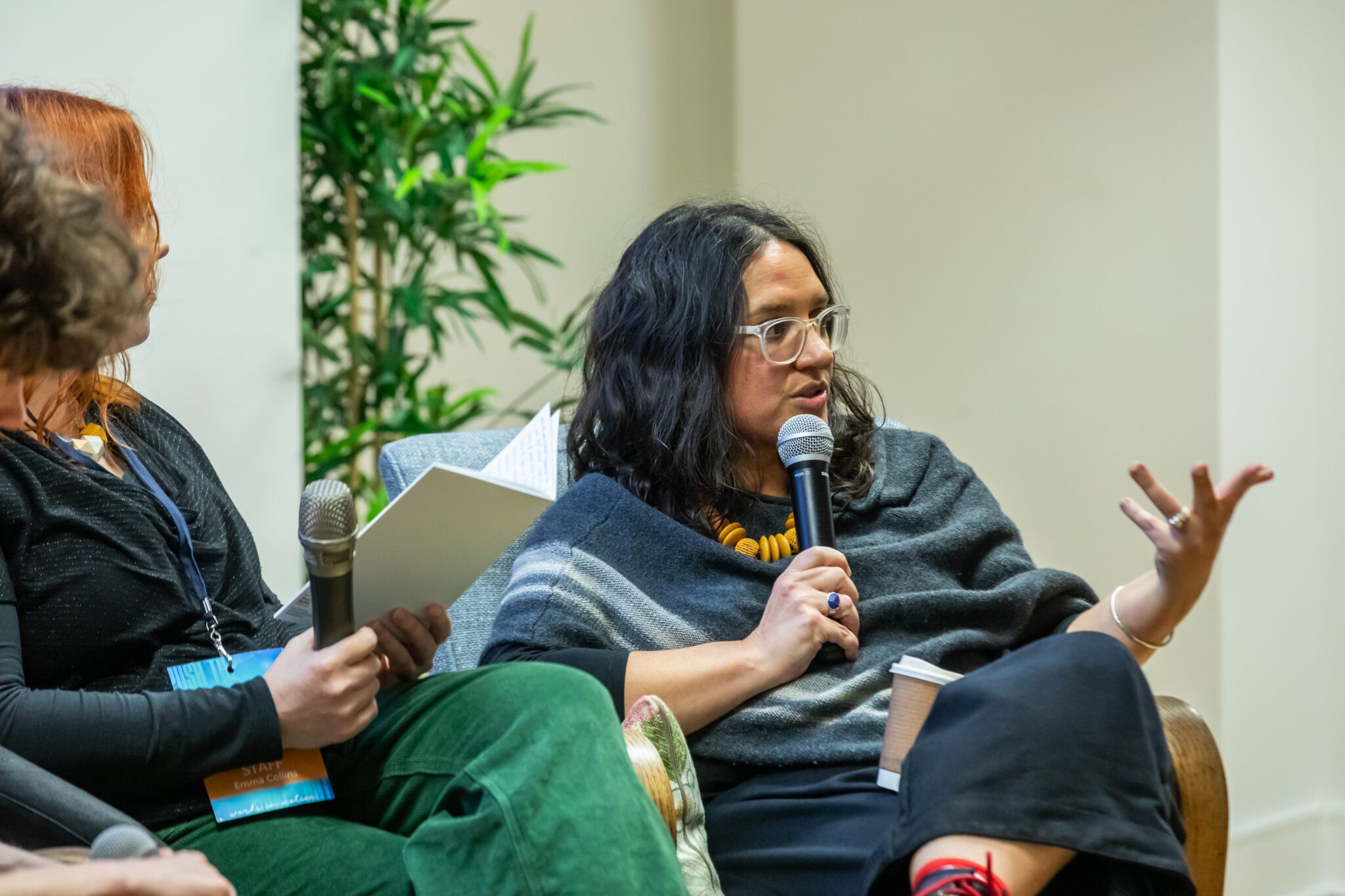
“The process from proposal submission to grant award felt slightly unclear at points.”
This was one of the pieces of feedback we recently received from our funded partners, and we thought it was worth addressing directly.
I’ve been applying for funding in Scotland for 25 years, working across areas like community health, culture, youth, and capital development, in both urban and rural settings. I’ve likely applied to nearly every funder available to Scottish charities and social enterprises – which gives me a valuable perspective in my current role as Partnerships and Learning Manager here at the William Grant Foundation.
This feedback from a grantee really resonated with me. Working at the Foundation has given me a clear understanding of how our process works, but I’ll be honest – it might not always be so clear to those engaging with us for the first time, especially if you’re more familiar with open funding programmes with set dates for deadlines and decisions.
Identifying and inviting potential partners
Firstly, it’s important to note that we are an invitation-only funder, using our networks and research to identify potential partners. Every funding relationship begins with a conversation and we spend time getting to know an organisation before deciding if we will invite a proposal for funding. This approach might be different from some funders, but we believe it helps us to make more informed decisions and have more time to focus on partnerships that are aligned with our interests and approach.
This recent article by IG Advisors, In defense of no unsolicited applications, makes thoughtful points about this approach to grant-making. I identified with their reflections that a proactive approach can help funders build deeper, more meaningful relationships with grantees and ensure that they are adding the most value with their funding. For us, it also helps focus our time and energy where they can have the greatest impact, rather than thinly spreading resources responding to a wide range of requests.
Responding to unsolicited enquiries
That said, we do welcome hearing from anyone whose work aligns with our interests – especially if it helps us learn or introduces us to promising or effective initiatives we might not otherwise come across.
Every enquiry that comes into our inbox is carefully reviewed. If there’s clear alignment with our interests, we may explore it further to learn more and we do sometimes invite funding proposals from organisations that contact us like this, though this is the exception rather than the norm. Sometimes, budget constraints or our existing pipeline of opportunities mean we can’t take an opportunity forward at that time, even if it’s a good fit.
Here is an illustration of how that breaks down.

Exploring new funding opportunities
Decisions about most of our grants are made by one of four ‘giving groups’ – you can read more about our structure and governance here.
Each group is responsible for one of our key themes and they all operate a little differently, with varying structures and meeting schedules. The groups meet approximately quarterly, and three of them also have subgroups on specific focus areas that meet in between. Their work is an ongoing mix of exploring new opportunities, making decisions on grant awards, learning from our existing partners, reflection and strategy development. So, for us, grant-making is a rolling process that doesn’t operate to fixed deadlines or timescales.
Here’s a simplified outline of how it works when we’re considering a new funding opportunity:

Being clear and responsive
Our typical process does involve a few rounds of information gathering and review, so can take up to a few months to proceed from initial investigations to a decision – occasionally longer. However, we also try to make it proportionate and recognise that sometimes acting with urgency is necessary if a grant is to be of most benefit to the recipient. Not having a rigidly prescribed process means we can tailor it to expedite this, if necessary.
Throughout, we aim to operate in an open and trusting way (you can read more about what this means to us here). This means we aim to keep prospective partners informed about next steps and likely timeframes.
Valuing feedback
We hope this gives you a clearer understanding of our grant-making process. Feedback is crucial to us, as it helps us improve how we work and communicate. The comment at the start of this blog came via one of the anonymous surveys we ask our funded partners to complete at different points during our relationship. But we welcome comments and suggestions from anyone who engages with us – whether we can fund you or not. Feel free to get in touch at foundation@wgrant.com.
Having spent thousands of hours completing funding applications, my feeling is that this approach is one that better respects people’s time. It has been a pleasure to be part of a Foundation that is genuinely interested in learning more about its areas of interest and how it can best contribute to meaningful change.
Jane has over 25 years’ experience in community development, social enterprise and funding in Scotland, and works as a freelance consultant and mentor to charities and community organisations. She’s currently working with the Foundation as Partnerships and Learning Manager, leading on our Scottish Culture and Heritage and Health and Social Causes themes whilst Rowan Boase is on maternity leave.

At the William Grant Foundation we’ve always been clear that we are on an improvement journey and that we can always get better.
One of the main ways we learn about how we can do this is to ask our grant-holders and partners what they think about our approaches, processes and their experience of us as a funder. It helps us identify opportunities to improve our effectiveness.
Getting grant-holder feedback
In March 2021 we introduced our grantee feedback system – designed to help us understand if we’re doing well and to help us discover how we could do better as a philanthropic funder. It consists of five short anonymous surveys issued at the appropriate time to:
- Successful new grantees
- Successful repeat grantees
- Those who have not been successful in getting funding from us
- Those who have recently submitted a project report to us
- Those whose grant relationship with us has recently ended
We’ve reviewed these surveys recently (including running a couple of focus groups with grantees – getting feedback on our feedback!) and made a few changes to the questions we’re asking. We also decided to introduce a survey for those whose relationship with us has recently ended because we’re currently thinking about how to do this well and responsibly.
We look at the results every 6 months to see where we have made progress, where we still need to improve and to discuss what action we will take. Once we’ve done this, we put together a light touch update for our grant-holders to keep them in the loop.
One of the benefits of this continuous process of seeking feedback is that we can use it to identify opportunities to improve our practice as we go and monitor the impact of changes by seeing how results change over time.
You suggested, we did (and are doing)
Here are a few highlights of what we’ve learned and changed to date as a result of the feedback we’ve received over the last few years.
CONNECT US: We could use our knowledge to connect our grant-holders to each other, other organisations and opportunities.
We started holding Foundation Forums as a way to do this. These are quarterly online networking and peer learning events to which all or grant-holders are invited. We’re also trying to proactively make more direct introductions.


PROMOTE US: We could more widely share the lessons and experiences that our grant-holders share with us and proactively promote their work.
The Foundation Forums are a great mechanism for this. We now also have our website – one of the key drivers for its development has been sharing the work and learning of our grant-holders.
Our Spotlight Stories are one new way we are using the website to do this, and we’ll continue to do so.
BE CLEARER: A few things could be clearer when we make a new grant, including what reporting is for and how it is used and how our relationship will ‘work’.
We introduced grant set-up calls with organisations after a new grant is made.
On these calls, we discuss our shared expectations and interests for the grant, shape reporting plans, share how we will make use of reports, and address other questions about our relationship.
We are trying harder to be more consistent about offering light touch, but useful feedback when we get a report


BE MORE OPEN: People would like to understand our plans and strategies better and to have more opportunity to help us develop and shape them.
We are trying out working more in the open.
We’ve had some support on how to do this from Third Sector Lab.
We’re starting to publish blogs and social media posts to share more, in real time, about what we are doing and how we are developing our approaches and our work in response to what we learn from our grant-holders and others.
Keeping you in the loop
Click here for the highlights and results from our latest batch of feedback data – collected between December 2023 and May 2024. Including what this tells us we can do better and what we plan to do about this.
We’ll now be sharing every feedback report on our website for everyone to read. We hope that by showing that we reflect and act on what we hear, we’ll encourage people to be open with us about how we can improve
Keep sharing your feedback
The Foundation’s impact is generated through our interaction with applicants and grantees, and by the role we play as an independent funder in the wider system of policymakers, other funders, charities and operating organisations. And our development and growth and our journey to be a better funder cannot happen without you.
So if you are one of our grant-holders and you get a survey request from us, please do take a few minutes to complete it. However, we welcome feedback at any time – so please feel free to share any comments or suggestions when they spring to mind, when you speak to us or when you are dropping us an email or an update.
